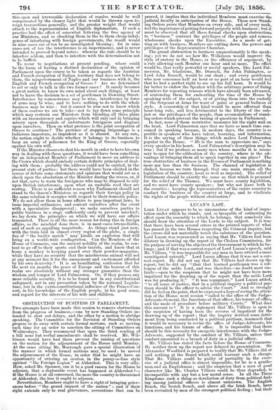OBSTRUCTION OF BUSINESS IN PARLIAMENT. Two attempts have been made
this session to remove obstructions from the progress of business,—one by new Standing Orders in- tended to shut out delays, and the other by a motion to abridge speaking. The Committee for the Revision of Standing Orders propose to do away with certain formal motions, such as moving each time for an order to sanction the sitting of Committees on Wednesdays. They recommend that upon the third reading of a bill none but verbal amendments shall be received. Mr. Wil- kinson would have had them prevent the raising of questions on the motion for the adjournment of the House until Monday. At the same sitting Mr. Murrough gave a special illustration of the manner in which formal motions may, be used : he moved the adjournment of the House, in order that he might have an opportunity of uttering an oration in the penny-a-line style
" the Foreign Legion" at Aldershot. This is very silly. Evnt,siisked Mr. Spooner, can it be a good. reason for the House to adjourn, that a deplorable event has' happened at Aldershot ?- if the House is at all concerned, the more the country is threatened at Aldershot, the less it ought to adjourn.
Nevertheless, Members ought to have a right of bringing griev- ances before " the grand inquest of the nation" ; and if their right extends only to real grievances, accusations• that can be proved, it implies that the individual Members must exercise the judicial faculty in anticipation of the House. These new Stand- mg Orders prove that Members on every side, and of every rank, feel the importance of getting forward properly with business ; but it must be observed that all these formal checks upon obstructions to " business " contract the privileges of the people and remove wholesome checks upon the Executive. As a mode of get- ting on with business, Members are cutting down the powers and privileges of the Representative Chamber.
The grand obstruction to business unquestionably is the speak- ing; yet we do not see how Mr. Wilkinson would improve the style of oratory in the House, or the efficiency of argument, by a rule allowing each Member one hour and no more. The effect would be, that really powerful or useful speakers, like Lord Pal- merston, Mr. Gladstone, Mr. Disraeli, Sir John Pakington, or Lord John Russell, would be cut short ; and every gentleman who now consumes half an hour or no his of an hour would feel that he had a perfect right to use up his full hour. It would be far better to endow the Speaker with the arbitrary power of fining.
re
Members for repeating reasons which have already advanced,
of sentencing them for embezzling the time of the House by speaking wide of the subject, or of giving them into the custody of the Sergeant at Arms for want of point or general badness of style. A censorship of that kind would be more effectual than hour-long rule, and less detrimental to the liberty of the sub- ject or the privileges of the people, than accumulations of stand- ing orders which prevent the raising of questions in Parliament. In fact, none of these restrictive measures hit the right nail on the head. Lord Palmerston says that we have so much time con- sumed in speaking because, in modern days, the country is so prolific in speakers who have talent, learning, and information. It is the saying of these things which makes Lord Palmerston popular in the House. " He is the man to appreciate me," says every speaker in his heart. Lord Palmerston's description may be true ; but if we produce so many men whose mouths it is neces- sary to open for the edification of the country, where is the ad- vantage of bringing them all to speak together in one place ? The true obstructive of business in the Houses of Parliament is nothing more nor less than the business. The channel of legislation is choked, because we tarn through that one main stream all the legislation of the country, local as well as imperial. The relief of Parliament should be exactly the same as that which is proposed for the relief of the Thames. We must have county legislation, and we must have coup speakers ; but why not leave both to the counties ; keeping e representatives of the entire country to conduct the business of the country at large, and to vindicate the rights of the people without obstruction ?


























 Previous page
Previous page